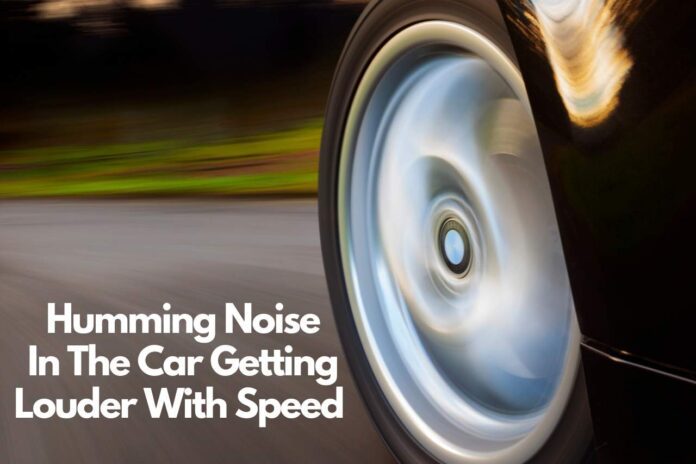It is not acceptable to drive your car that far when a leakage, unusual noises, or other problems occur. Due to a different problem with your car, the engine makes certain distinctive noises. Several automobiles are said to make a humming noise when traveling at higher speeds. Many individuals have a pressing concern about why the humming noise in car getting louder with speed.
Driving a vehicle that makes a zipping noise is highly uncomfortable since it may both irritate and damage your automobile simultaneously. You can uncover the solution by looking for specific unusual car symptoms. This guide will provide detailed insights into the causes of your car becoming noisier and answers in case you can’t identify it.
Quick Summary: Humming noises are the earliest sign of a wheel bearing failing since they ensure steady wheel rotation. Tire noises, poor aligning, and occasionally a malfunctioning gearbox are other potential culprits.
Typical acceleration sounds include several noises. Asking yourself if you have ever encountered the sounds in question is the simplest way to determine whether it gets anticipated. Have you ever experienced the noises you hear before? There’s an issue if the car generally seems overly raucous. For various causes, a vehicle may create loud noises, several of which are signs of a potentially severe root issue. Let’s look at the humming noise in car getting louder with speed.
Humming Noise In Car Getting Louder With Speed – All You Need To Know
There are several possibilities why going quicker in your automobile can cause it to start humming.
What Causes Humming Noise In A Car
-
Bad Wheel Bearing
Wheel bearings are an essential part of your vehicle. They assist the wheel in spinning and staying in position. If they begin to hum, it may be a clue that they require to be changed. Whenever you operate your automobile, the bearings may start to produce a noticeably louder as they age out. It’s due to the rotating wheel putting extra strain on the bearings as the automobile accelerates higher. If you hear a buzzing sound coming from your car, have it evaluated by a professional as quickly as possible. It might only require a replacement pair of wheel bearings, which is a reasonably simple adjustment. But if the rollers are too aged, they could have to be changed entirely, which could be a considerably costly fix.
-
Tire Noise
Unbalanced tires are the most common source of an odd sound you notice that becomes louder. Suppose your tires have any breaches; no matter how tiny it is. In that case, the TPMS technology will notify you when your tires are down on air and report any leakage, no matter how minor that gets found. Every tire’s lateral motion inside the wheel rim varies in intensity as the automobile travels through place irregularly. The TPMS technology might read a misleading leakage indication whenever the detectors cannot recognize this.
-
Alignment Issues
A common source of this buzzing noise is improper wheel balance. The automobile can shake more whenever the wheel orientation is off. The buzzing noise you perceive is a result of this shaking. Having the tire alignment examined and fixed quickly is crucial if your automobile produces this disturbance.
-
Bad Ball Joints
Ball joints are a typical additional source of humming noise in car getting louder with speed. Your car typically produces a crunching sound when driving or, more frequently, a snapping sound at the beginning of each spin if the ball joint gets torn out. Irrespective of their unpleasantness, they are relatively easy to change and significantly improve your vehicle’s effectiveness.
-
Failing Transmission
The malfunctioning gearbox can be the culprit if you notice a buzzing noise beneath the flooring. The wheel bearing’s wear can get attributed to numerous factors. It first results from the gear mechanism are failing. For the automobile to operate, the gear is crucial in absorbing the energy. If this mechanism is damaged, the transmission will not function properly and provide poor conveyance noise.
The blocked hydrocarbons in the system may delay the universal couplings’ ability to operate. The fuel remnants might dry up and lodge in the gearbox if you keep the automobile out of service for a significant duration. The gasoline the gearbox uses is also inefficient, which comes last. A scarcity of fossil fuels will result in noise in transportation; the system also requires fuel to operate efficiently.
What To Do When Humming Noise In Car Getting Louder With Speed
There are various approaches you would use to tackle the matter.
-
Replace Wheel Bearings
Suppose your automobile starts generating a buzzing sound that worsens as you drive. That scenario might indicate that your wheel bearings must get replaced. Wheel bearings maintain your tires in alignment and enable them to turn correctly. They might make a buzzing sound as they fade out.
-
Get your Tires Balanced
Among the most frequent issues with cars are noisy tires. Usually, balancing your tires will solve the problem. What you need to do if your automobile starts to hum and grows harsher as it speeds up is as follows:
-
- Align your wheels rapidly. The main task in solving the issue is this one.
- Double-check the pressure on your tires. Slightly deflated or massively inflated tires can produce humming sounds.
- Inspect the fitment of your wheels. Unbalanced wheels could also cause humming sounds.
Diagnostics
Take your automobile to the local technician or workshop for inspections if changing the wheel bearings doesn’t stop the buzzing sounds. The wheel adjustment will probably get checked first, and they’ll also look for any root issues with your automobile.
Bottom Line
We have examined the many reasons why a car starts to hum and grows louder as it speeds up. In almost all situations, changing old wheel bearings with replacements is the fix. It would fix your issue and improve your vehicle’s control and effectiveness.
Related Reads: Discover More Content You’ll Love
